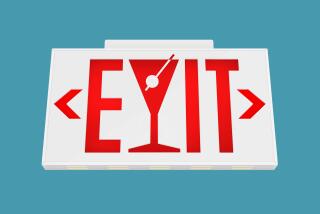Sober -- and silent
- Share via
A dozen years ago, after my first novel came out, I was on a live radio talk show in New York City when the show’s host asked, “So, are you in AA?”
It was a logical question. My first novel took place at a drunk farm whose clientele attended meetings. And trying to figure out what’s biographical in a fictional work is the favorite sport of many interviewers -- and readers. Everyone wonders: What’s true? What’s not? At readings and talks, one of the most frequent questions a novelist faces is some version of: Is the main character based on you? My first published short story was about a young woman who shot her boyfriend in the foot. I can’t tell you how many people -- from complete strangers to my own father -- have asked if I ever shot a boyfriend in the foot.
But the New York interviewer’s query went beyond pert curiosity in that it contained and disregarded a critical fact: Members of Alcoholics Anonymous are supposed to be anonymous.
The literature is clear on this. Members “need always maintain personal anonymity at the level of press, radio, television and films.”
And: “Anonymity is the spiritual foundation of our program, ever reminding us to place principles before personalities.”
Now my third novel is being published, and the direct personal questions loom again. The book tells the story of a young history professor who wakes up from an alcoholic blackout in jail to the news that she ran over and killed two people. She goes to prison, gets sober, rebuilds her life. Already, even pre-publication, I’ve been asked if I’ve been to prison and, yet again, if I’m in that program. (For some reason, no one is interested in whether I’ve taught history.)
I asked a friend, a now-sober novelist who also writes about recovery, how he handles such inquiries. “I say I’m in recovery, or even that I’m in a 12-step program, but I never get specific.”
This seemed coy, a thin disguise -- and to what purpose? “Why not just fess up?” I asked.
He sent me to the fellowship’s literature, including the pamphlet, “Understanding Anonymity,” put out by AA’s General Service Conference.
Back in the 1930s, when AA was new and a terrible stigma was attached to alcoholism, anonymity was meant to protect group members from public disgrace. (Apparently, at some early meetings, people draped their faces and even wore masks -- until they realized that everybody had the same goods on everyone else.) Alcoholism’s stigma has lessened since -- to the extent that celebrities go through rehab on reality TV -- but many drunks still appreciate the discretion and security that anonymity offers.
Personal anonymity at the public level also protects the group. During the fledgling years of the fellowship, some very prominent people got sober and became enthusiastic spokespersons for AA. Unfortunately, some of these same prominences soon fell off the wagon, disastrously and publicly.
Better, then, not to have any spokespersons.
Other early members of a more entrepreneurial bent exploited their connection to AA for personal gain.
Thus, through trial and error, the principle of anonymity evolved and became a means not only of ensuring a member’s privacy but of preventing misrepresentation of the group for selfish purposes.
My sober novelist friend summarized it this way: “The idea is not to set yourself up as any kind of spokesperson or expert in public.”
A helpful reminder, perhaps, to any novelist. For, in addition to the recurrent biographical questions, one is given ample opportunity to extemporize on the various topics raised in a novel -- in my case, prison, AA, drunk driving, English as a second language. After all my research -- most of which didn’t get into the book -- the soapbox tempts!
But the difference between an expert and a novelist can become embarrassingly clear. A friend of mine who wrote a novel about a family with an autistic child was asked to take part in a discussion at a luncheon. To her mortification, she found herself on a panel with real experts: autism researchers and parents of autistic children. What could she add to that discussion?
The sober novelist also pointed out that there is a time and a place to “break” anonymity on book tour. “If an interviewer or a reader takes me aside,” he explained, “and tells me, one on one, ‘I’m having a terrible time with alcohol,’ I don’t hesitate.”
The need for anonymity dissolves when there’s an opportunity to be of service to a fellow sufferer. Anonymity ceases to be useful when you can save someone’s life.
More to Read
Sign up for our Book Club newsletter
Get the latest news, events and more from the Los Angeles Times Book Club, and help us get L.A. reading and talking.
You may occasionally receive promotional content from the Los Angeles Times.










